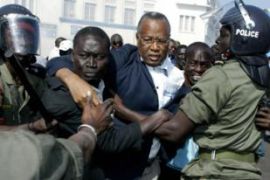Senegal presidential campaign opens
President Abdoulaye Wade is seeking re-election at the age of 80.

Published On 5 Feb 2007
Speaking at Mbacke in the central west of Senegal, where 95 per cent of the population is Muslim, Wade said that he worked for all religions and had built both mosques and churches.
Addressing a crowd composed chiefly of young people, Wade recalled that he had opened his campaign in Mbacke seven years ago. He underlined his record in education and promised help for the countryside.
“I invest 40 per cent of the [state] budget in education. This bet on the future will be won when children become producers,” he said.
“Senegal will then go further than all the countries of Africa.
“If God so wills, I will do better for the rural communities which will have no cause to envy the big cities.
“If during the past seven years I had not done good work, you would not be there today,” he said to applause.
There are 15 candidates for the election, among them Moustapha Niasse (67) and Idrissa Seck (47), both former prime ministers, seen with Dieng as Wade’s chief challengers.
But doubt surrounds the position of Seck, once seen as Wade’s protege, who went into opposition and spent seven months in preventive detention in 2005 and 2006 in connection with embezzlement charges.
Postponement fears
On January 22, Wade created a general surprise by announcing that Seck had returned to the presidential fold; but Seck himself did not confirm the news and maintains his candidacy, while not excluding a return “to the liberal family”.
|
“If God so wills, I will do better for the rural communities which will have no cause to envy the big cities” |
The political atmosphere has become more sombre in recent days with the controversial postponement of legislative elections originally due to be held at the same time as the presidential vote.
Press reports suggested that the presidential poll, due to be held on February 25, might also be put off.
On January 27, a rally organised by the opposition and civil society ended in the violent arrest of three presidential candidates, among them Dieng and Niasse.
But tensions eased with the confirmation of the date of the poll and the postponement of a banned opposition march.
Senegal is considered an example of African democracy as it has never known a coup since gaining independence from France in 1960.
Wade, a free market supporter, lost presidential elections in 1978, 1983, 1988 and 1993 before being elected in April 2000, ending 40 years of socialism. The campaign will close on February 23.
Source: News Agencies